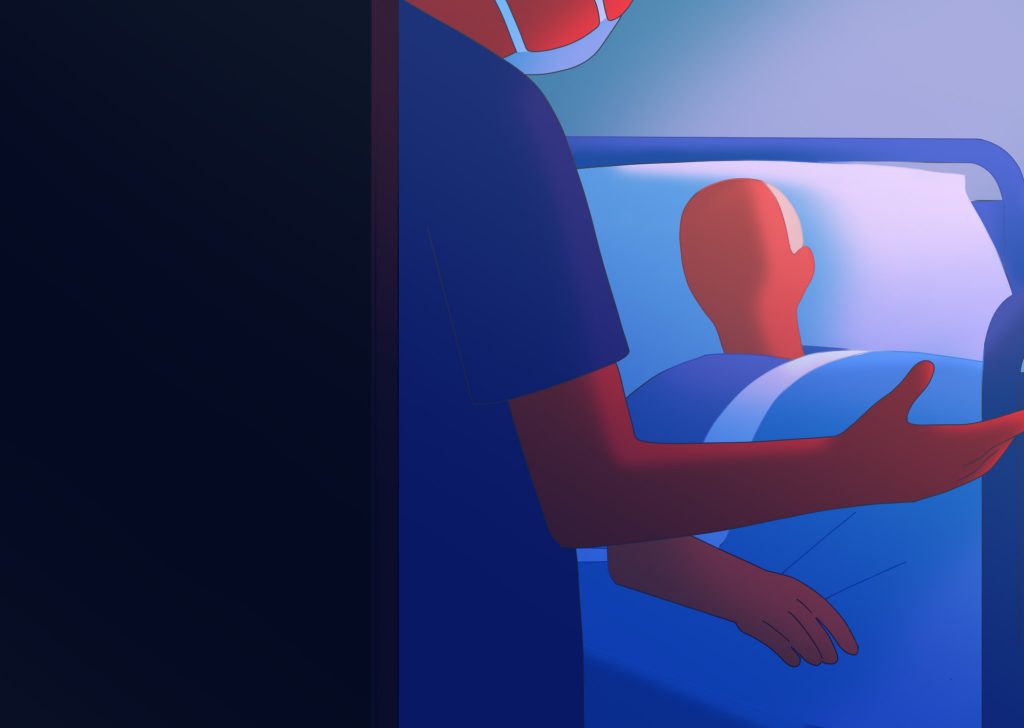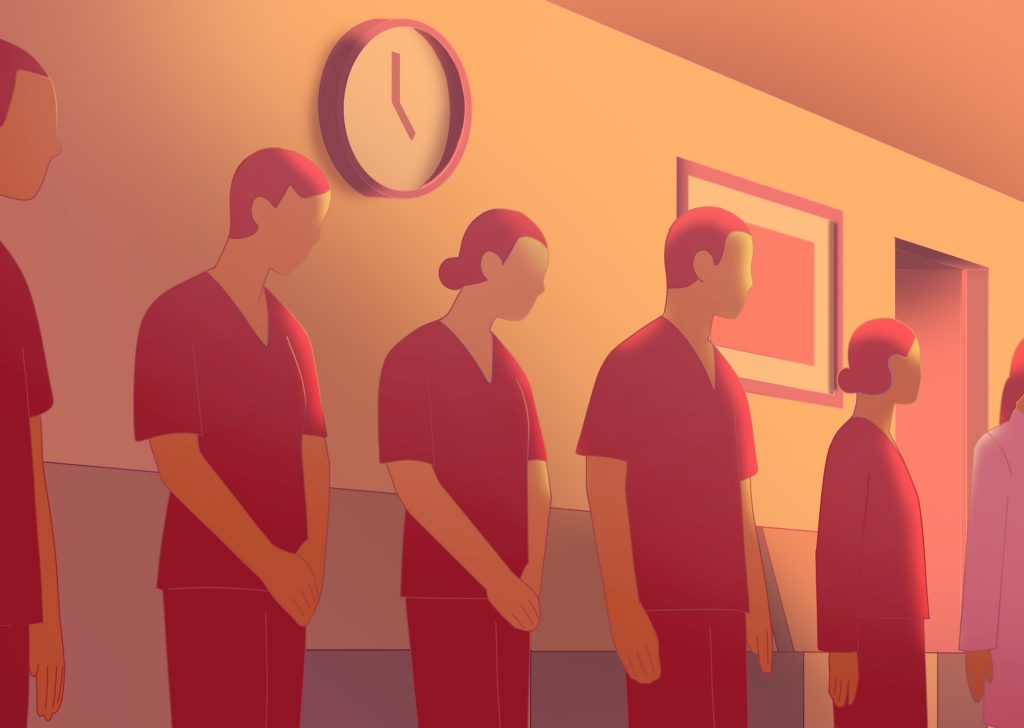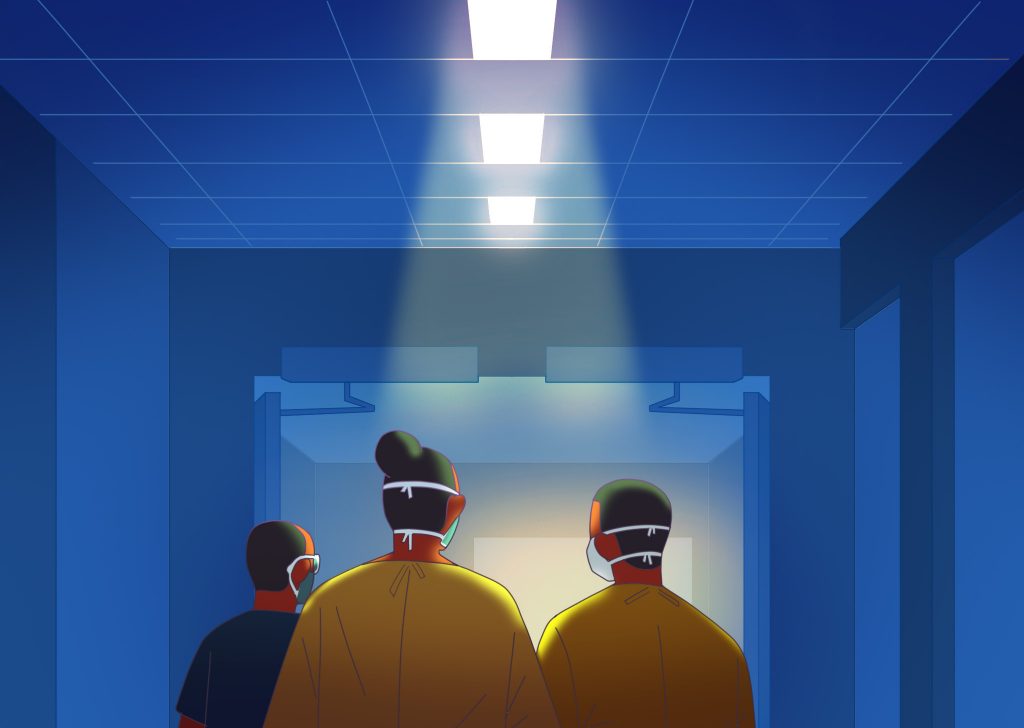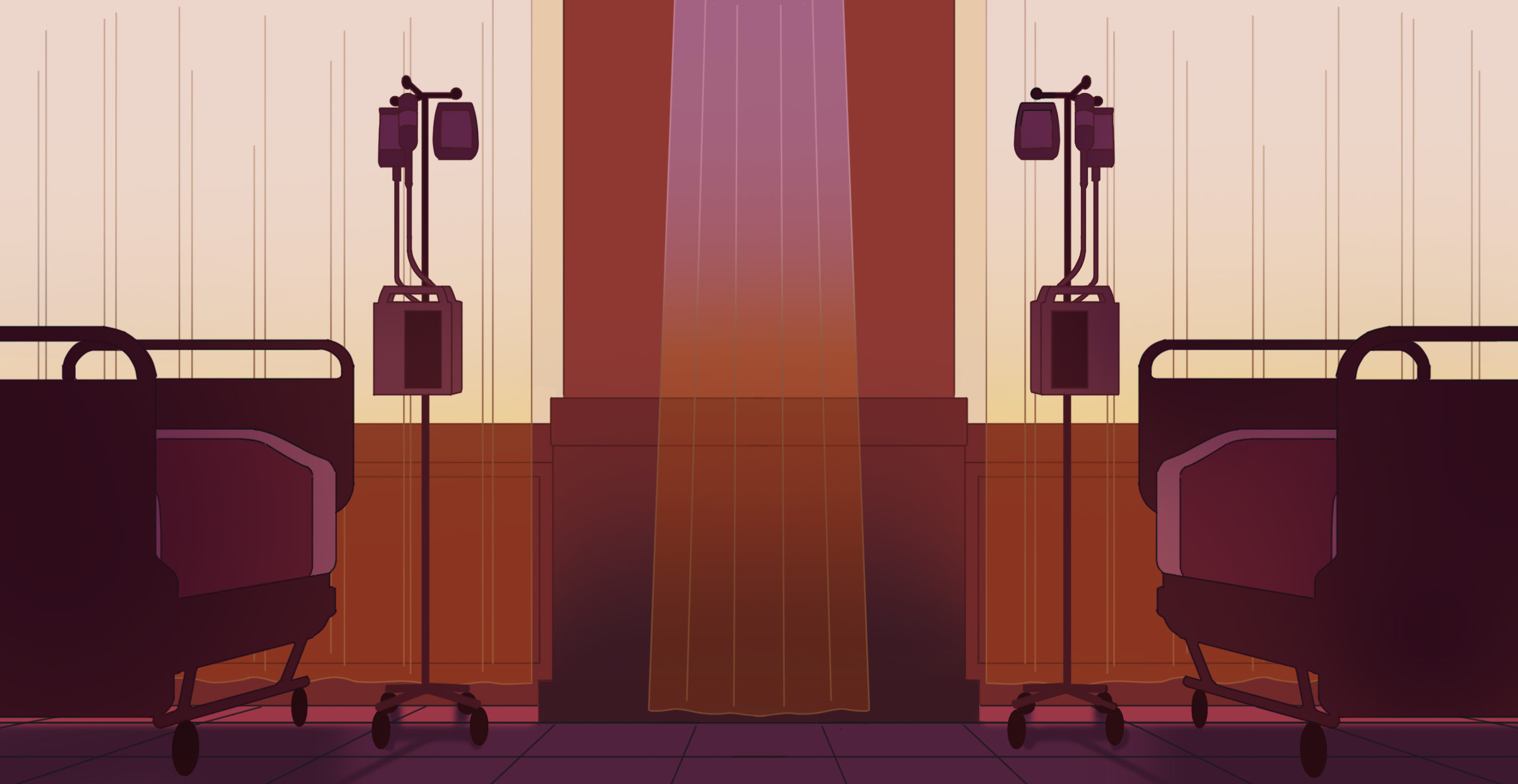All illustrations by Audrey Halim for RICE Media.
Neo Hwee Shuen was a nursing student in the surgical ward when she faced something no medical professional looks forward to: the death of a patient.
She remembers the patient as someone who initially appeared relatively well—she was conscious and could, at times, sit up on her bed. However, her condition deteriorated over the week, and one afternoon, the patient’s heartbeat began to slow. Her daughter had left for lunch. The patient was alone, struggling to breathe.
The patient previously agreed on a non-resuscitate status, so there were limited forms of medical intervention that the hospital’s staff could do.
The son was present in the ward. He took his place by his mother’s side, urging her not to leave—at least, not before the rest of their family could arrive. The depth of his desperation—and the grief that was about to blossom—was not lost on Hwee Shuen. She followed the lead of the patient’s son, gently asking the patient to hold on just a little longer. As the patient took her final breath, her daughter returned.
“I wasn’t sure what I should do at that point, as a student nurse,” the 25-year-old professes. She could only comfort the patient’s daughter, offering her a seat when she was initially too stricken to move. When the patient’s daughter regained her composure, they would then perform the procedure of the last office together.
Over the years, Hwee Shuen would do the same for many patients.
A Patient’s Final Discharge
Last offices encompass a series of procedures done shortly after a patient’s death is confirmed. This mainly includes cleaning the deceased’s body, changing their attire, and removing all monitoring equipment and identification tags. These tasks are executed with the utmost care—dignity and respect are afforded at every turn.
In some instances, this process involves taking care of the body as though they were still alive.
“We engage in a conversation with the deceased,” Hwee Shuen explains, “and we inform them of each step.” Even now, while serving as a staff nurse in the Children’s Intensive Care Unit at KK Women’s and Children’s Hospital, her initial encounter with death remains forever etched in memory.

“I felt overwhelmed,” she admits. “I thought I didn’t do anything significant to lessen the family’s grief.”
On that day, the children of the deceased patient expressed their gratitude at the end of the last offices. Hwee Shuen teared up on her way home, still reeling off the events that took place in quick succession.
Since then, as part of her job, Hwee Shuen recognises the simple power of supporting the family through their grief. It makes a difference. Understandably, the job has also taken a toll on her—from witnessing the passing of her patients to comforting their grieving loved ones.
A significant number of her current patients are critically ill children.
“Parents, understandably, feel anxious; they want updates on their children’s condition all the time. As much as possible, we strive to ease their worries,” Hwee Shuen notes. When a child passes away, it’s especially difficult for parents to come to terms with the sudden grief.
“That’s why we involve them in performing the last offices. We support them through this final meaningful task they can do for their children,” she adds.
“Still, it’s not easy.”
Last Offices and Palliative Care
Hwee Shuen chose nursing out of a genuine desire to help others. An often-cited quote still deeply resonates with her: “In a world where you can be anything, be kind”.
Empathy is important to her—always has been—and it’s an essential part of carrying out the necessary work on a daily basis.
“These are aspects of the job that nursing school can never fully prepare you for. So, these days, I’ve learnt to channel my emotions into enhancing the care I provide for my patients and their families.”

For Pamela Koh, 33, a palliative care nurse at Dover Park Hospice for more than 13 years, she came to recognise that death is part and parcel of life.
“Palliative care is more than just providing physical care. In addition to providing comfort and managing the pain of a patient, it encompasses the psychosocial and spiritual well-being of the patient as well. It embraces a humanistic approach that focuses on providing compassionate care for patients in the last phase of life. This aspect of palliative care deeply resonates with me,” Pamela emphasises.
It’s not just her experience that attests to that—she saw it for herself as a young girl when her grandfather was a palliative care patient at Dover Park Hospice.
“[The hospice’s] multidisciplinary healthcare professionals took the time to understand his needs and provided support for the activities he wished to do,” she recalls.
“Now, in my role, I am always upholding the dignity of my patients, reminding them that they are still in control of their lives,” Pamela adds.
When a patient passes on, Pamela ensures ongoing emotional support is provided to the patient’s family. As they cope with their grief, providing space for mourning is crucial for this process.

At Dover Park Hospice, the last office process will include the nurses informing the patient’s family when the patient passed on. Some of the religious last rites, such as leaving the body untouched for eight hours in honouring the patient, will be observed at the patient’s family’s request. As grief takes its hold, the nurses would guide the family through the entire process.
“Every time a patient passes on at Dover Park Hospice, the clinical team will observe a moment of silence as a mark of respect for the patient,” she adds. Known as the ‘Honour Walk’, the staff would line up along the corridor as the patient’s body passes through the ward.
Walking On
Maintaining the dignity and honour of our patients is of utmost importance. Pamela recalls building a close bond with an elderly patient who was admitted without next-of-kin. Pamela provided comfort to the patient till the very end.
In the patient’s final moments, Pamela stayed by her bedside, holding her hand and comforting her till she took her last breath.
On days like these, Pamela is grateful for the support from her supervisor and peers where she can share her emotions in safe space. On days off, she finds time to exercise and spend quality time with her family as a way to unwind.
On her end, Hwee Shuen used to perceive death as a distant concept and primarily linked to old age.
Understandably, her perspective changed after meeting patients who are young children. Despite dedicated efforts from the healthcare team, these children still succumb to their conditions. Witnessing their passing weighs heavily on her.
Considering this, Hwee Shuen expresses a newfound appreciation for life, focusing on engaging in activities that bring her happiness. That, and colleagues to rely on during the hardest shifts.
“What really helps to keep me going also is a support network that I have,” she says, bringing up her peers at her hospital, along with her close friends outside of work.
“Every day, [it] doesn’t feel like you’re fighting the battle alone.”

The Journey Continues
“Nursing is a fulfilling career,” Hwee Shuen states. “It’s undoubtedly complex to care for individuals in their most vulnerable state.”
It’s certainly fulfilling and taxing at the same time—managing caregivers of sick patients who want some understanding and young patients who might be confused and afraid. For the latter, it required her to adapt on the job: “I could only learn when I started working.”
To her, nursing itself is a diverse domain. It possesses different specialities, which all present unique challenges—those who are interested in pursuing nursing should also understand the niche they wish to focus on.
“Palliative care nursing is a deeply fulfilling and gratifying job,” adds Pamela. “If you have what it takes to be a palliative care nurse, I strongly encourage you to take on this job as a career as we are doing something meaningful every day.”







